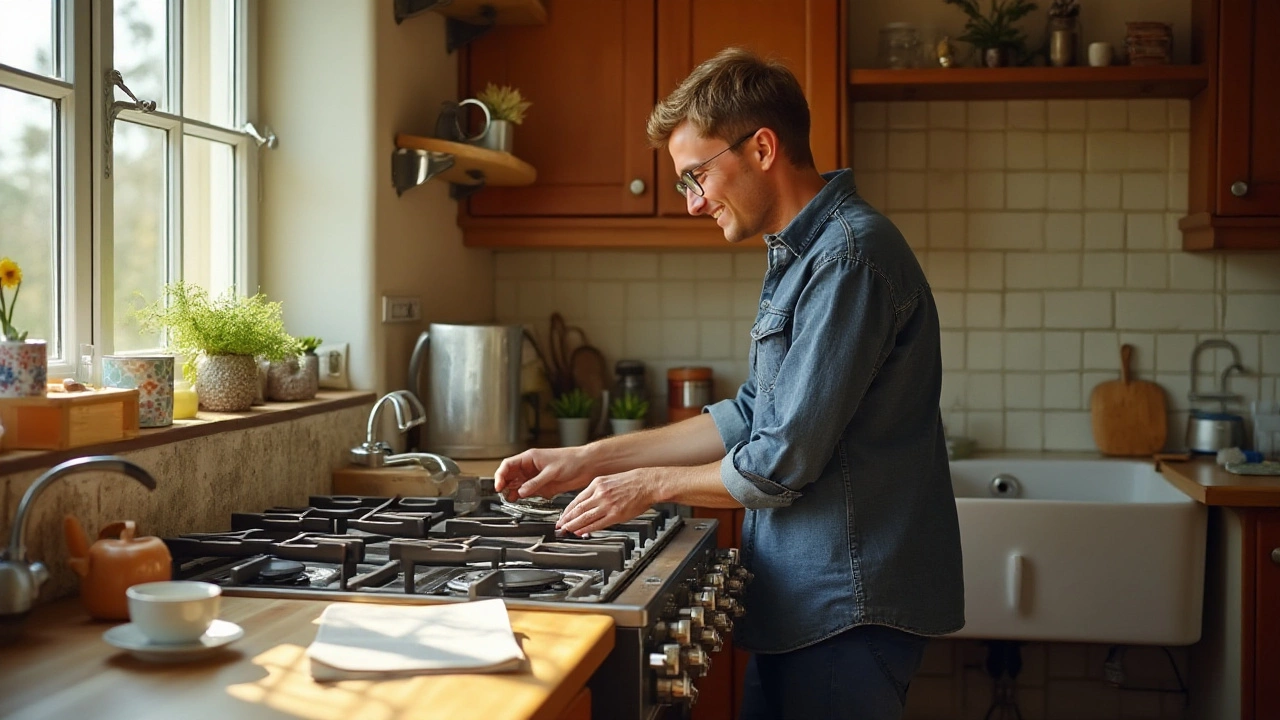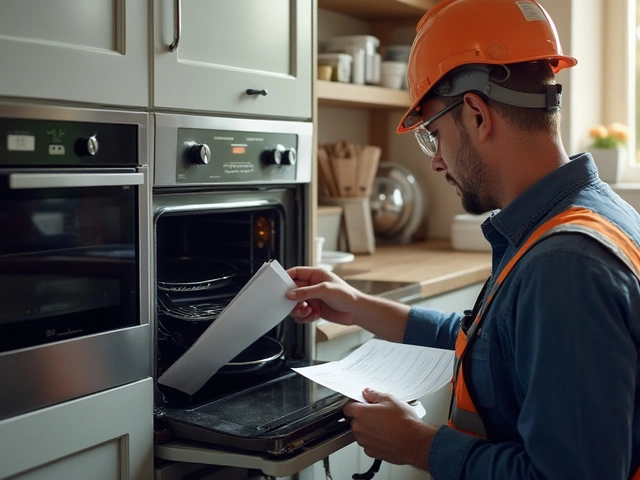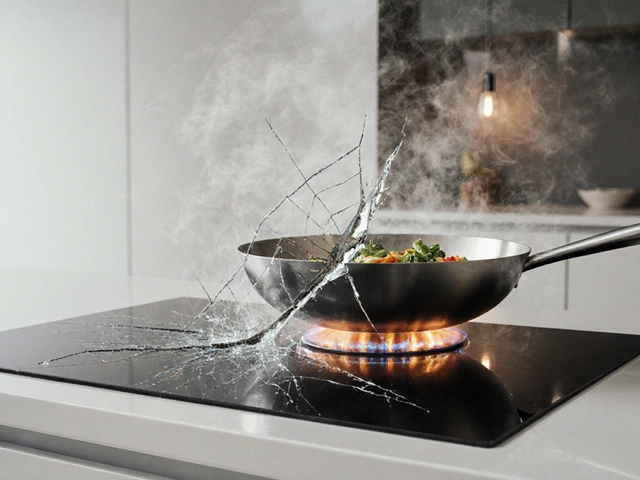Gas hobs have become an essential component of everyday cooking in kitchens across the globe. Efficient and quick to adjust, these appliances are beloved by chefs and home cooks alike. However, like any piece of equipment that sees regular use, they are susceptible to wear and tear.
In this article, we'll dive into the world of gas hob repair, addressing the most frequent issues you might encounter. We'll guide you through basic troubleshooting techniques and highlight situations where professional help becomes necessary. Moreover, we'll share tips to help you extend the lifespan of your gas hob, ensuring it remains a trusty sidekick for all your culinary adventures.
- Understanding Common Gas Hob Issues
- Simple DIY Repairs You Can Try
- When to Call the Professionals
- Prolonging the Life of Your Gas Hob
Understanding Common Gas Hob Issues
In the bustling heart of any kitchen, the gas hob stands as a reliable ally, ardently heating everything from a simmering soup to a sizzling stir-fry. However, just like a trusted steed that's overworked, gas hobs can sometimes falter. Understanding these common issues can save you from unwelcome surprises and ensure your meals continue unabated. One of the most frequent troubles is the persistent clicking sound of the ignition, a sound that stubbornly persists even when the burner is lit. This can often be traced back to moisture trapped within the ignition system, often the result of overzealous cleaning or unfortunate spillovers. Occasionally, it could also be an issue with the ignition mechanism requiring either a good manual dry or, in some cases, replacement.
Another issue cooks may face is a burner that refuses to ignite or remains unsteady. This inconvenience can often catch you by surprise, especially when dinner is on a tight schedule. Often, the cause lies within clogged burner ports, where residues from cooking have formed an obstruction. Simple routine clean-ups can prevent these blockages. In some instances, an apparent flame failure could also be caused by a misaligned igniter or a faulty gas line. Maintaining these components in proper alignment can make all the difference in ensuring your kitchen appliance runs smoothly.
Temperature irregularity can spoil the perfect cooking experience, especially if a dish demands precise heat control. It's another challenge for gas hobs. Often, the culprit is the flame spreader, which if warped or damaged, may cause an uneven distribution of heat. Cleaning or replacing these parts can often restore the steady temperature you're accustomed to. Gas supply issues can also lead to similar problems, causing the flames to burn lower than usual. This is usually resolved through a professional check of the gas flow to ensure no leaks or pressure problems are at play.
A less frequent but equally troubling issue is the foul odor of gas lingering even when the hob is off, raising alarms for safety. This calls for immediate attention. Oftentimes, it might just be that the knobs are not completely in the 'off' position, or an issue with the gas pipe connections which requires immediate inspection and sealing if necessary. It's critical to understand and respect the workings of your gas hob, harnessing its capabilities while ensuring all components are functioning optimally.
"Regularly inspecting your kitchen appliances not only enhances longevity but also assures safety—a practice we should all adopt," suggests renowned appliance expert, Tom Walters.
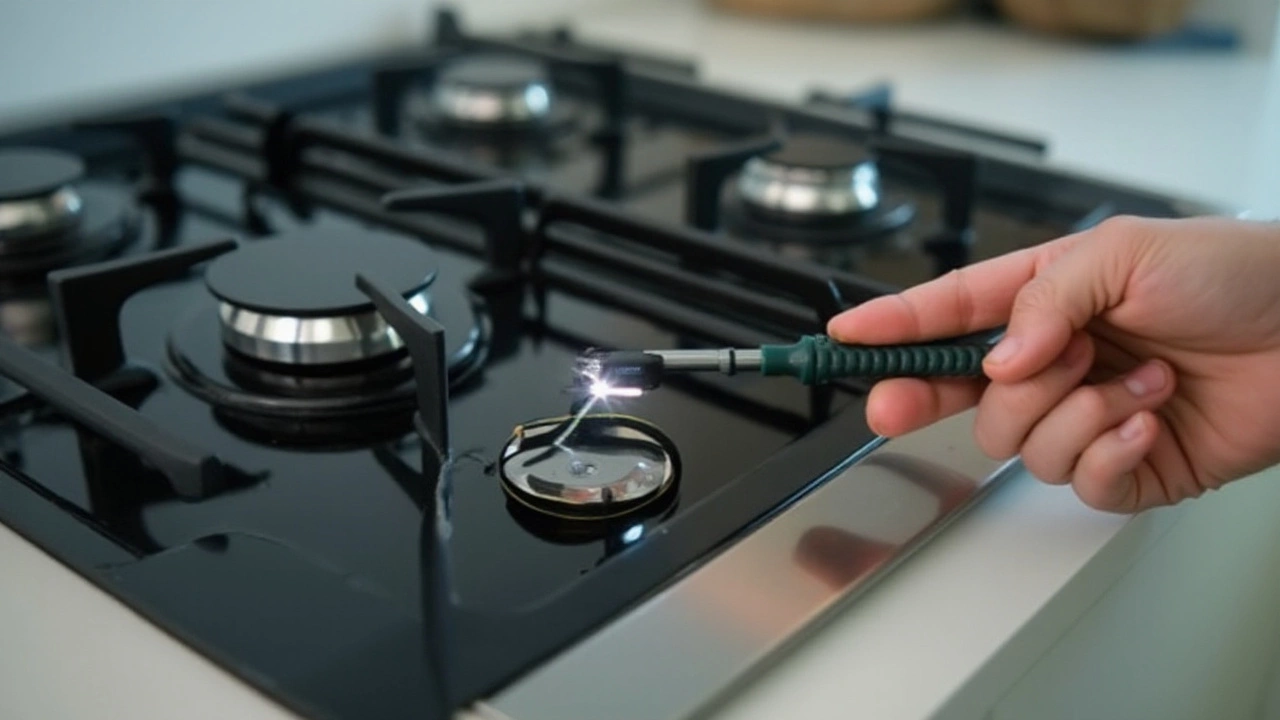
Simple DIY Repairs You Can Try
When your gas hob decides to act up, it doesn't always mean you need to panic or call in a professional right away. Often, the issue is something you can handle on your own with a bit of patience and some common household tools. The first step in executing a DIY repair is to identify the nature and source of the problem. Is the issue with ignition, burner flames, or perhaps strange noises emanating from the appliance? Each symptom offers clues about what might be amiss and, consequently, about the nature of repair required.
For instance, if your burners are not lighting properly, the problem might be with the spark igniter of the hob. Just like an engine that won't start because the spark plugs are shot, the igniter's failure to produce a spark can leave you and your cooking plans in the cold. However, a cleanup and gentle scrub can often solve this problem. Due to grease and food debris, igniters can get grubby, which interferes with their function. With the hob off and cool, use a clean, dry brush to remove any buildup around the igniter point.
Another common issue could be uneven flames. If you've ever noticed one burner blazing like a bonfire while another barely flickers, it might be due to clogged ports, which can lead to uneven gas outlet distribution. This is something you can tackle with a steady hand and a small needle. Carefully insert the needle into the clogged ports to free them from gunk. This simple act of housekeeping can transform your kitchen appliance from a cantankerous beast back into your reliable cooking partner.
"It's remarkable how often seemingly complex problems have simple solutions," says Jane Morris, a seasoned appliance repair specialist. "A bit of cleaning and routine maintenance can differentiate between a minor inconvenience and a major headache."
DIY hob fixes also involve assessing if there's an issue with the gas supply. Ensure the supply valve is fully open. If the hob still doesn't light up or has weak flames, inspect the gas line. Sometimes, a gentle nudging is enough to troubleshoot leaks or blockages, but significant issues should be deferred to professionals for safety's sake. It's important to trust your senses and judgment, particularly the smell of gas, which can hint at unanticipated leaks.
Lastly, test your burners periodically and perform maintenance checks to ensure they're heating evenly. Simple actions such as these can preempt an inconvenient breakdown, saving you both time and money. Yet, remember, if at any point during your DIY endeavors, you feel uncertain or uncomfortable, it’s wise to contact a professional for prudent advice. Armed with the right strategies and a little know-how, you can ensure your gas hob repair efforts are a success.
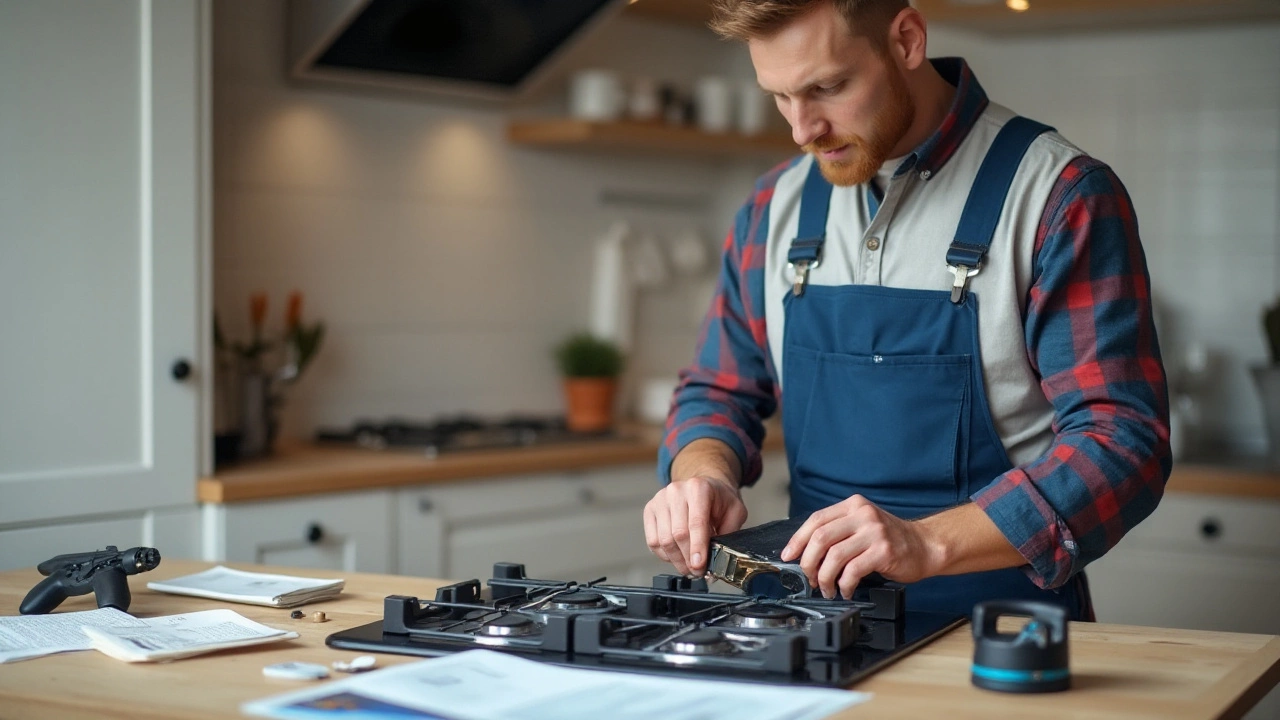
When to Call the Professionals
While tackling minor DIY hob fixes can be rewarding and cost-effective, certain scenarios require the expertise of trained professionals. Understanding when to step back and seek professional assistance can save time, prevent further damage, and ensure the safety of your kitchen environment. But when exactly should you make that call? Let's explore the situations where a professional is your best bet.
One common issue faced by gas hob owners is a persistent gas smell. This could point to a leak, a potentially dangerous problem that requires immediate attention from a qualified technician. Often, hob leaks occur because of cracked fittings or worn-out seals that are difficult for untrained eyes to detect. Given the serious ramifications of a gas leak, including the risk of fire or health hazards through inhalation, it is crucial not to delay contacting a professional. As John Drengenberg, the Consumer Safety Director at UL, noted,
"Safety should always be your primary concern. When in doubt, calling a professional is the best course of action."
Sometimes, you might notice that a hob burner is giving off an uneven flame or not igniting at all. While this may occasionally be chalked up to dirt blocking the gas jet, if cleaning doesn't resolve the issue, it could be an indicator of a fault within the ignition switch or the internal wiring. These components shouldn't be tampered with unless you're expertly trained, as improper handling could lead to further complications.
Moreover, if your gas hob requires part replacements, such as a new ignition module or valves, it's wise to invest in the service of a skilled technician. Not only do they have access to suppliers of high-quality, compatible parts, but they also provide insurance, ensuring that any further breakdowns are covered.
Many top manufacturers recommend regular maintenance checks and annual servicing as a preventative measure to keep your hob running smoothly. Statistics suggest that professionally maintained appliances have a longer lifespan and improved safety records. According to a study by the Home Appliance Manufacturing Institute, well-maintained hobs last an average of 18 months longer than those without professional oversight, showcasing the value of routine professional services.
Lastly, if your kitchen appliance is still under warranty, DIY interventions might actually void that agreement, leaving you without crucial protections. When work is performed by certified technicians, they usually complete documentation required to maintain your warranty.
Budgeting for professional repair and maintenance can seem daunting, but consider it an investment in the lifespan and safety of your appliance. While you may handle basic issues yourself, trust the professionals when the problems run deeper, ensuring your hob stays in top-condition for years to come.
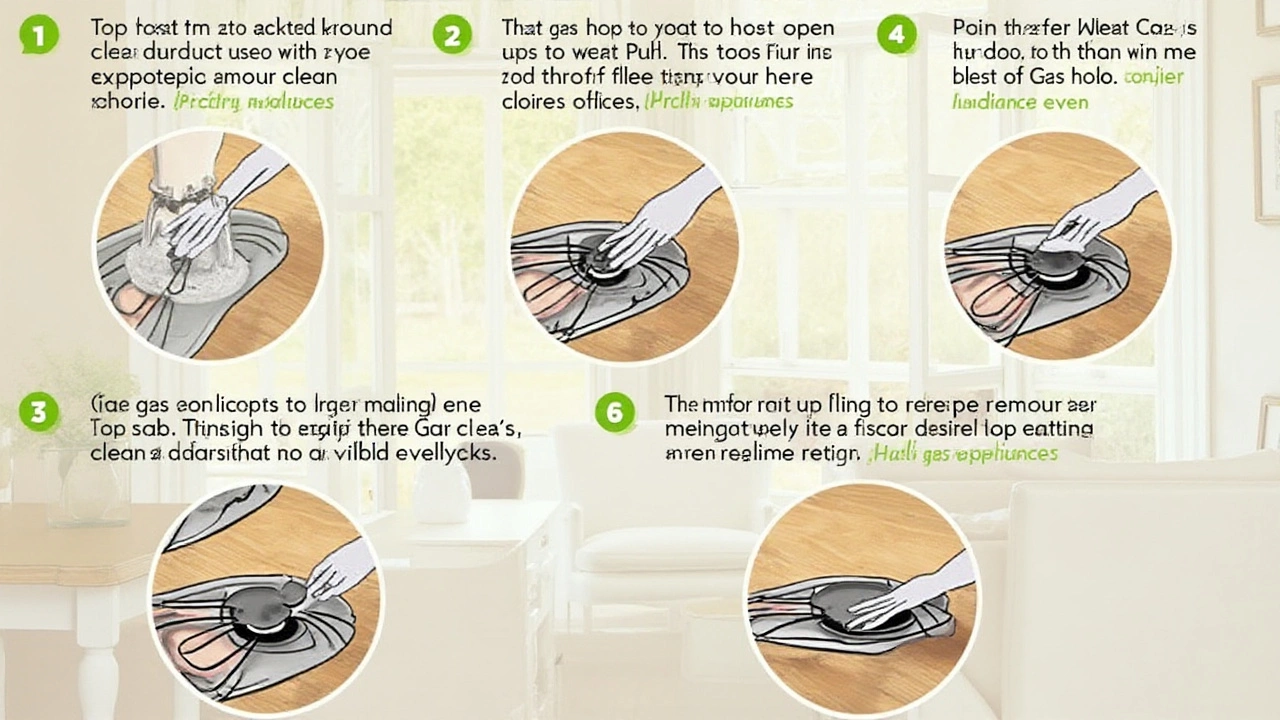
Prolonging the Life of Your Gas Hob
The lifespan of your gas hob isn't set in stone, but with proper care and attention, these trusty kitchen companions can serve you well for many years. It all starts with regular cleaning, which is crucial not just for hygiene, but also for functionality. After each use, waiting for your hob to cool down before wiping away any spills can prevent the dreaded crusty build-up. Use a soft cloth and a cleaner specifically designed for hob surfaces to avoid scratching or damaging the enamel.
Every three months or so, it’s worth doing a more thorough cleaning. Disassemble the removable parts like burners and grates, soaking them in a solution of warm water and mild detergent. This process helps in removing grease that can clog and affect performance. Also, take this time to inspect the gas ports for any blockages. Using a thin wire can help you gently clear any debris, ensuring the gas hob functions efficiently and safely.
Preventative maintenance is just as important as cleaning. Ensuring that any pot or pan used on the hob has a flat and stable bottom can help distribute heat more evenly, reducing strain on the hob’s parts. In addition, it's important to be mindful of the size and weight of cookware. Excessively heavy or oversized pots can exert undue pressure, risking damage to the hob’s components.
Regular Maintenance Checks
Routine inspections can play a vital role in prolonging your gas hob's life. Start by regularly checking the hob for loose knobs or unusual sounds. Addressing minor issues promptly can prevent them from transforming into costly repairs. Listen for flowing gas when the hob is off, as a persistent smell might indicate a leak that requires professional attention.
According to the Home Repair Institute, "Preventative maintenance extends an appliance's lifespan by an average of 25-30%. Regularly checking and maintaining kitchen appliances not only ensures safety but also saves homeowners money in the long run."
Keep an eye on the flame color; ideally, it should be steady and blue. Yellow flames might suggest incomplete combustion, which could be due to dirt on the burner, or worse, a gas supply issue. If cleaning the burner doesn’t fix the problem, it could be time to call in a professional.
Another beneficial tip is using a gas stabilizer, which adds an extra layer of safety. Such devices are particularly useful in areas where gas supplies can be inconsistent. They ensure a steady flow to the hob, maintaining optimal performance and reducing the risk of component stress.
The Role of Professional Inspections
While DIY maintenance goes a long way in gas hob repair, annual professional inspections can address underlying issues unnoticed during regular use. These inspections can involve testing the gas pressure, checking for leaks, and calibrating burners to guarantee optimal efficiency. Consider this an investment in extending the life of your appliance and ensuring personal safety.
Implementing these practices not only prolongs the lifespan of your hob but will enhance its performance as well, reflecting the love and care you invest into your home appliances. Maintaining your gas hob requires diligence and care; however, it ultimately ensures your appliance not only lasts longer but operates safely and efficiently.

